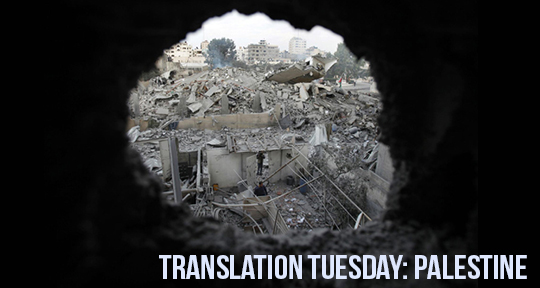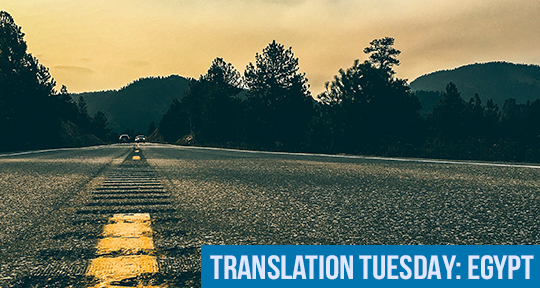The maqama is a trickster tale genre from the classical Arabic tradition. In the Maqamat of Badi’ al-Zaman al-Hamadhani—from whose ‘Maqama of the Blind’ the verses at the end of this text are taken—the itinerant narrator reports from towns and cities across the Middle East and Central Asia, encountering the mysterious rogue Abu al-Fath in a different guise each time. The challenge of evoking this intertextuality and the stylistic specifics of the maqama (which is traditionally written in rhymed prose, a feature that El-Wardany gently plays with here, and like premodern Arabic writing more generally, is not punctuated) offered the opportunity to experiment with visual presentation and stylistic eclecticism in the English translation.
—Katharine Halls, translator
Having travelled a great distance we stopped for a break, took refuge in a petrol station where we filled up the tank and emptied our bladders and stretched our stiff muscles until, refreshed, we got back in the car, determined to cover what distance remained My wife took the wheel, it being her turn, and before she started the engine she said, Let us roll a spliff, which we did, but then as she turned the key to start the ignition a man appeared, I don’t know where from, bald and clean-shaven and wearing a jacket, and flagged us down, Are you going to Berlin? and we were, we said, so begging our kindness he asked for a lift I looked at my wife and my wife looked at me, and then, decided, we looked back, Jump in—as long as you’re not a highwayman, God forbid, so he fetched two huge bags from the verge, loaded up, and sat down beside them and then we set off.
The air in the car took a turn for the cagey, for here we were all of a sudden with a stranger We didn’t know who he was or where he was going, he just sat in the back seat not saying a word, and but for the eyes of the oncoming cars which flashed past like ghosts, it was silent and dark Then when I glanced across at my wife, I saw she was lighting the spliff we’d just rolled, and it surprised me to see she’d decided to impose this habit of ours on the car as a whole, but no sooner had we taken a puff or two than our bald companion leant forward and plucked it from our hands, saying Man! What a friend for the road. READ MORE…


